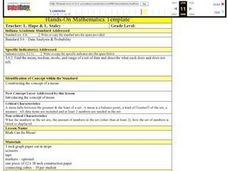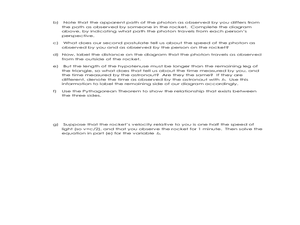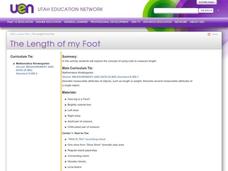Curated OER
"Spooktacular Patterns" - A Math Unit for October
Students extend a pattern using everyday objects. They use sound and objects to make a pattern
Curated OER
Math Can Be Mean!
Fifth graders are introduced to the topic of means. Calculating the mean, mode and median, they describe what each set of numbers tell and do not tell about the data. They use a line graph to practice finding the mean. They also use...
Curated OER
Mondrian, Math, and Amazing Colors
Learners study geometric shapes, lines, and the primary colors as they create Mondrian-like art prints.
Curated OER
Teaching Students Mathematical Reasoning Skills
Students can build upon their basic math skills and become higher order thinkers when we encourage the following principles.
Curated OER
Most and Least Likely
Explore probability with beginners using these multiple-choice visuals. They determine what they are most likely to choose from a bag by examining the contents. Each bag has three types of similar objects with one more prevalent than the...
Curated OER
Probability
How likely is a new baby to be a boy? Or for snow to fall in August? Mark the likelihood of various events on probability lines. For extra practice, have your fourth and fifth graders make up different scenarios in their lives to...
Curated OER
Radical Equations
This task gives geometry learners practice in solving radical equations in one variable and zeros in extraneous solutions.
EngageNY
Radicals and Conjugates
Make the irrational rational again! Continuing the theme from previous lessons in the series, the lesson plan relates the polynomial identity difference of squares to conjugates. Learners develop the idea of a conjugate through analysis...
EngageNY
First-Person Computer Games
How do graphic designers project three-dimensional images onto two-dimensional spaces? Scholars connect their learning of matrix transformations to graphic design. They understand how to apply matrix transformations to make...
EngageNY
Stretching and Shrinking Graphs of Functions
Why is that graph wider? Pupils learn about stretching and shrinking graphs of square root, absolute value, cubic, and quadratic functions. They study both vertical and horizontal stretches and shrinks in addition to reflections.
Curated OER
Time Dilation and Geometry
Students solve problems of dilation and velocity. In this geometry lesson, students apply the Pythagorean Theorem to solve problems and relate it to time and velocity.
Balanced Assessment
Egyptian Statue
Investigate the proportional relationships of length, area, and volume. Learners use the dimensions of rectangular prisms to create ratios and proportions. They compare the different ratios to solve more advanced problems.
101 Questions
Building Boxes
Build foundational knowledge of volume by building boxes. Given dimensions for a piece of grid paper, young mathematicians determine the number of possible open-top boxes it will make. As part of this task, they also find the box with...
HeyMath!
Volume of Pyramid
Go beyond the basic formulas and uncover the surface area and volume of 3-D shapes with this comprehensive and organized worksheet packet. The problems include the basic formula computations while also challenging your learners to derive...
Curated OER
The Length of My Foot
Here is an excellent lesson for young learners who are just beginning to explore the concept of using units to measure length. They rotate through four classroom centers in order to gain practice in utilizing this important skill.
College Preparatory Mathematics
Geometric Probability
For this geometric probability worksheet, students solve and complete 12 different problems that include determining the outcomes of various types of probability. First, they use a tree diagram or an area model to compute the desired...
EngageNY
Analyzing a Graph
Collaborative groups utilize their knowledge of parent functions and transformations to determine the equations associated with graphs. The graph is then related to the scenario it represents.
EngageNY
Translating Graphs of Functions
If you know one, you know them all! Parent functions all handle translations the same. This lesson plan examines the quadratic, absolute value, and square root functions. Pupils discover the similarities in the behavior of the graphs...
Alabama Learning Exchange
Twisted Tangrams
Primary geometers create a picture using tangrams. In this geometry instructional activity, students read Grandfather Tang: A Tale Told with Tangrams, cut out their own tangrams, and choose a character from the story to make using their...
Curated OER
Spoonfuls, Cupfuls and Handfuls
Explore the use of non-standard units for measuring volume with elementary learners. They fill a container and count the number used using cups, spoons, and bottles, build with blocks and count the number of blocks used, and compare and...
Curated OER
Measuring Real Stuff
Looking for a good lesson plan on measurement? This one could be for ytou! Learners select and use appropriate nonstandard units to measure and compare lengths and weights of real-life objects. They use problem-solving skills to design a...
Curated OER
Equivalent Fraction Paper Strips
Young learners compare the relative values of fractions by making physical representations. They fold and label strips of paper that are equal in length to represent "one whole" and the equal parts that fractions represent. Also, they...
Curated OER
Barbie Bungee
Middle and high schoolers collect and analyze their data. In this statistics lesson, pupils analyze graphs for linear regression as they discuss the relationship of the function to the number of rubber bands and the distance of the...
Curated OER
Symmetry Worksheet
This resource offers a series of hands-on activities in which learners sketch and construct symmetrical origami, paper dolls, snowflakes, and polyhedra while adhering to specific requirements. These activities ask class members to...

























